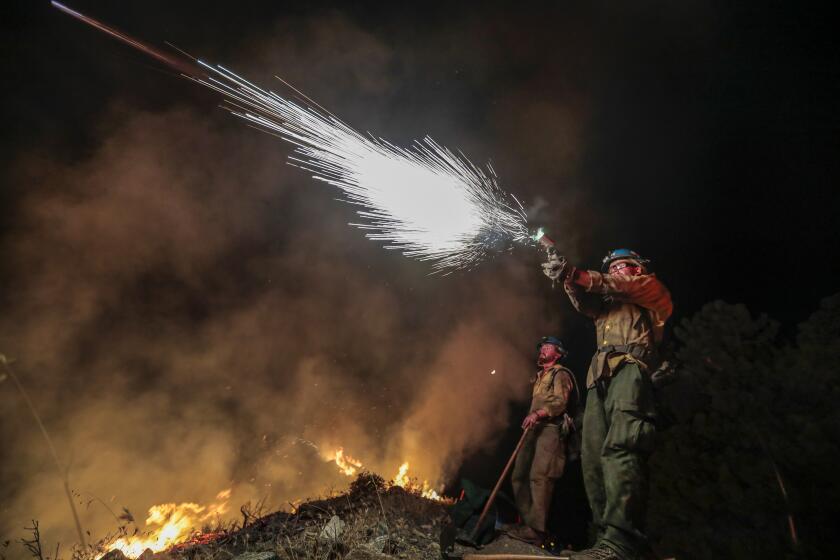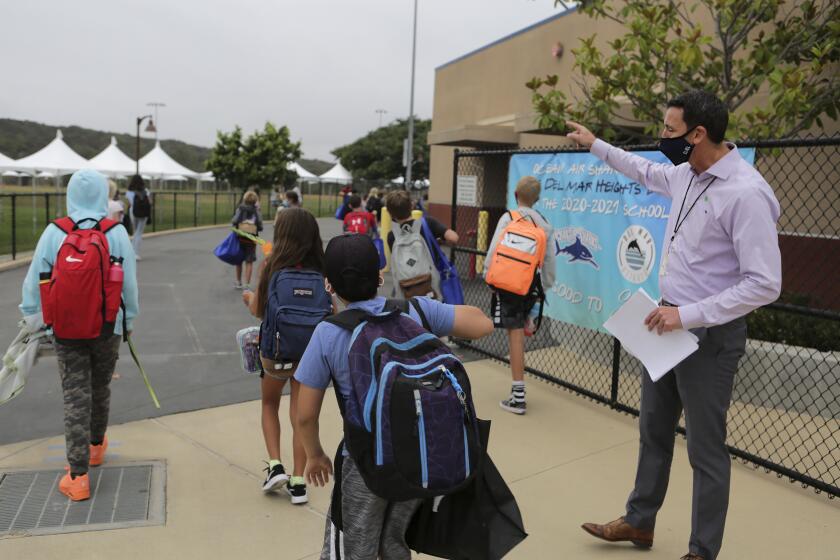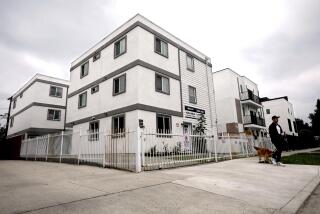Why didn’t these L.A. hotels house homeless people? A new report offers some answers
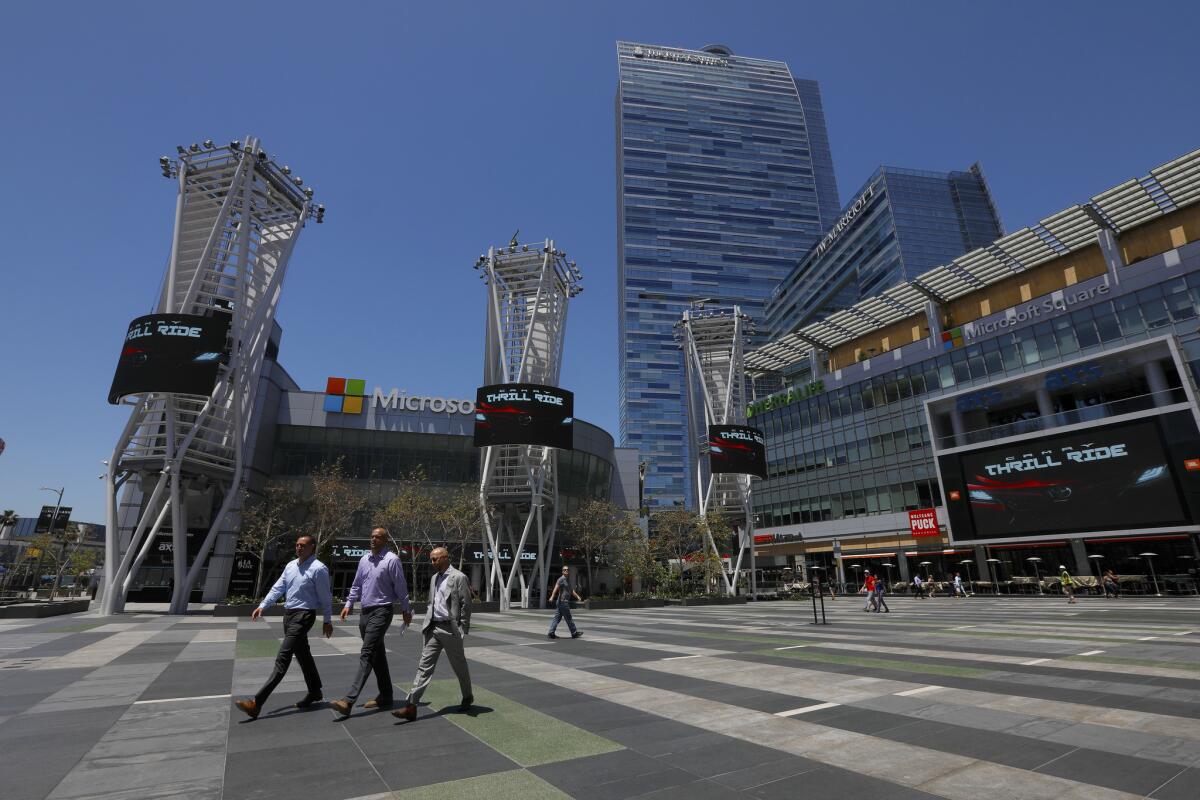
- Share via
When Los Angeles city and county officials reached out to local hotels, hoping to lease rooms through a new program meant to help homeless people survive the COVID-19 pandemic, they ran into a host of concerns.
One downtown hotel was worried about how participating in the program, Project Roomkey, would affect its brand, according to a report issued this week by a city analyst.
Several hotels said they were already housing medical workers, police officers or both. And one was prepared to participate until a company, one that made up a major portion of its business, threatened to pull out of the hotel if homeless people moved in, according to the two-page report.
The report, prepared by the city’s chief legislative analyst and based on information provided by negotiators for Los Angeles County and Mayor Eric Garcetti, sheds light on some of the challenges encountered by government officials as they tried to secure rooms for Project Roomkey, a program meant to help medically vulnerable people living on the streets during the pandemic.
So far, roughly 4,100 people have been housed in hotels across Los Angeles County, far short of the program’s 15,000-person goal. The city’s report focused only on hotels in L.A. that received taxpayer assistance or were built on sites currently or formerly owned by the city or its former redevelopment agency. None took part in Project Roomkey.
‘They are in a firefight right now, because it’s so close,’ a fire official said of crews positioned at Mt. Wilson.
According to the report, some of the hotels were involved in other programs during the COVID-19 pandemic, such as housing medical personnel. Some were deemed to have logistical issues, such as elevators that increased infection risk. And some gave no reason for their lack of interest.
Jon Vein, who negotiated some of the Project Roomkey agreements on Garcetti’s behalf, said the vast majority of the hotels he dealt with were “trying to do the right thing” and searching for ways to participate.
Still, he said, there were also “bad actors,” whom he declined to name.
In one case, a lender threatened to pull its financing if the hotel moved ahead with Project Roomkey, he said. In another, a company that managed several hotels “was very clear that they did not want any of the hotels that they managed to house homeless people,” said Vein, who sits on the city’s convention and tourism commission and worked on Project Roomkey in a volunteer capacity.
The report had been sought by Councilmen Mike Bonin and Marqueece Harris-Dawson, who argued that hotels that received taxpayer subsidies should have been participating in the program.
“The broader issue that this helps inform is, why hasn’t Project Roomkey been more successful?” Bonin said. “Is it unwillingness on the part of the hotels? ... Too much bureaucracy? Too many rules? And honestly, it sounds like all of the above.”
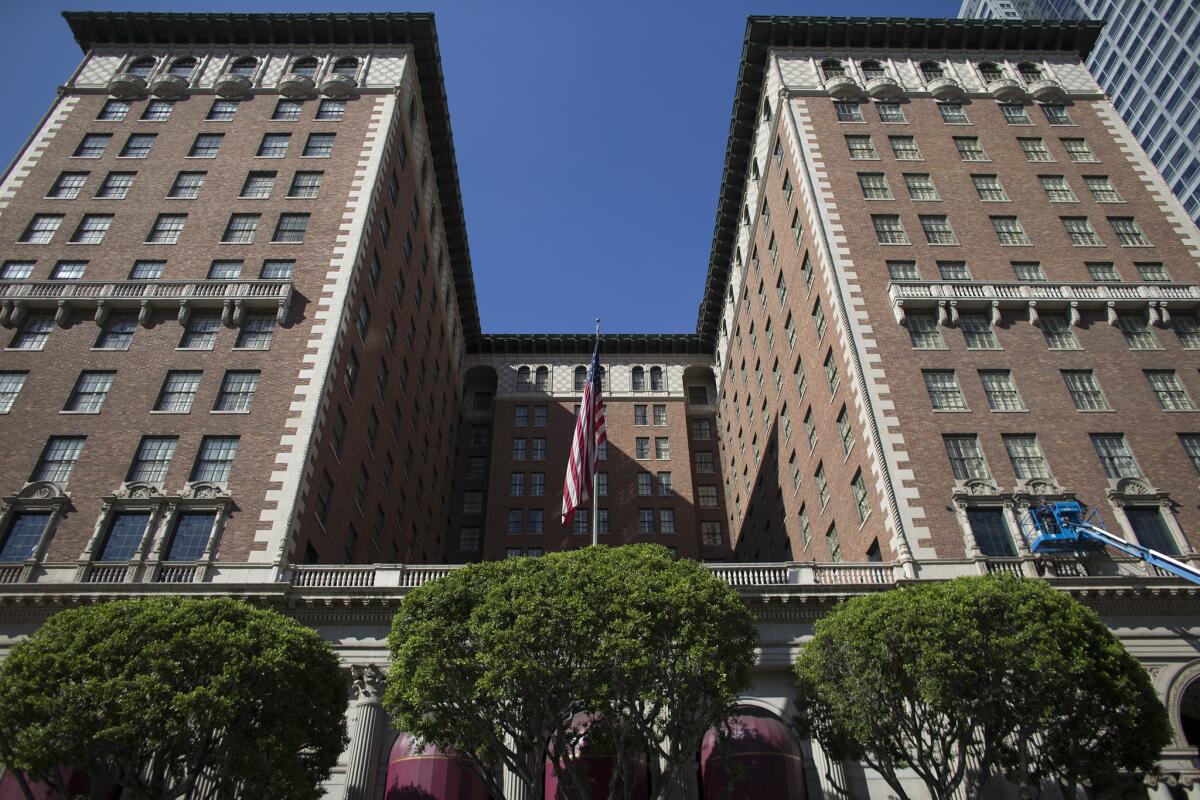
Heather Rozman, executive director of the Hotel Assn. of Los Angeles, said local hotels worked with government officials to house healthcare workers and those with COVID-19, among others. But they found the contracting process for Project Roomkey “extremely complex,” she said, and struggled to get answers on when and how the program would conclude.
“With this limited information, hotels had to then obtain approvals from various stakeholders, including lenders and insurance companies,” Rozman said. “This made it difficult for some hoteliers to be able to sign contracts.”
A corporate spokeswoman for Omni Hotels & Resorts did not respond to messages from The Times seeking comment on the report, which stated that the Omni Los Angeles had concerns about Project Roomkey affecting its brand.
The Millennium Biltmore, which was described as being close to a deal on Project Roomkey until an unnamed company threatened to pull its business, also did not reply to messages. But Vein, the city commissioner, said the Biltmore spent weeks working on an agreement, only to have an airline company threaten to cancel its business with the hotel if Project Roomkey came in.
“That put them in a difficult situation,” said Vein, who declined to name the company.
The city report indicated that if a hotel was continuing to serve the public, providing rooms to medical personnel or had permanent tenants, it was “generally not eligible to participate in the program.” For example, the hotel complex at L.A. Live, which did not take part, has “many full-time residents,” the report said.
Our special-edition newsletter breaks down the latest coronavirus news, including inequities in which schools can reopen and how coronavirus testing and tracking will work once they do.
Christopher Yee, spokesman for the Los Angeles Homeless Services Authority, said Project Roomkey sought to lease entire hotels so that medically vulnerable homeless people were not put at risk by other guests who were not observing the same protocols. For negotiators, that meant focusing on empty hotels or those large enough that populations could be kept in separate wings of a building, Vein said.
L.A. has used state funding to pay for the lease agreements with hotels, paying an average nightly rate of $94.23 per room, or roughly $120 in the downtown area, according to a recent report. Project Roomkey sites provide meals and medical monitoring and are staffed around the clock with site managers, security and case managers.
The city’s report did not say how much taxpayer money had been provided to the 12 hotel properties, which were assisted between 1973 and 2015. City Controller Ron Galperin reported two years ago that the council had signed off on $1 billion in subsidies, much of it for hotels, since 2005.
Throughout the summer, activists have voiced alarm about dangerous conditions facing homeless Angelenos — first coronavirus, then extreme heat and, now, smoke. The Los Angeles County Coroner’s office reported Tuesday that heat exposure had contributed to the deaths of at least three people believed to be homeless, two in Los Angeles, over the Labor Day weekend.
Jed Parriott, an organizer with Street Watch L.A., repeated the activist group’s demand that the city seize hotels to house homeless people instead of negotiating with willing owners. Most of the subsidized hotels, he said, are located downtown, not far from “the epicenter of homelessness: skid row.”
“The excuses are unacceptable during this human rights crisis,” Parriott said.
More to Read
Sign up for Essential California
The most important California stories and recommendations in your inbox every morning.
You may occasionally receive promotional content from the Los Angeles Times.
